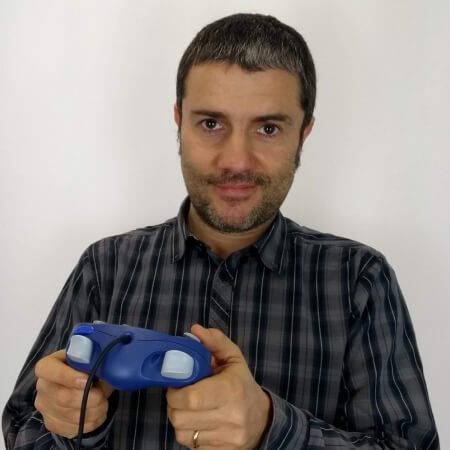The Health Games Incubator
2nd EDITION · 2024
Design and implement applied game experiences that improve motivation and adherence to treatment.
Registration open until 12 August.
Don't miss the second edition's DemoDay!
💫 We held the second edition of the Serious Games Lab incubation program with a Demo Day at Tech Barcelona's Pier07. The 3 incubated projects presented their major advances in front of an auditorium full of professionals from the #health sector.
Serious Games
The aim is to move people to action and better focus adherence to treatment.
Applied in health increase people's motivation, whether in an internal context (health profile) or external (patient profile) and help to transfer and educate in order to achieve a positive behavioural change and from their own will.
Serious Games Lab
Serious Game Lab is the incubator that will help you create a serious game based on a health need. You will be able to put it into practice with a pilot in a real healthcare environment.
Improve people's motivation
Better explain and educate on health
Empower and work towards adherence to treatment
Undertake health promotion services
And ultimately, to promote the improvement of quality of life
Who are we looking for?
Teams interested in starting a business with their product or service in health from a Serious Game perspective. These are some of the profiles that we think may fit better:
Health professionals
Managers
Consultants
Administrators
Promoters
Students/Teachers
Entrepreneurs
Therapists
Developers
...and in the end, any team interested in undertaking projects to improve health.
Program phases
Until Aug 12
1. Selection
Applicants must submit their applications and the selection committee chooses the winners.
Sep 1
2. Audit
Sep 12
3. Pilot
Dec 18 2024
4. Final Pitch
What will you get?
Accompaniment to develop a Serious Game prototype in health and offer the possibility of piloting it in a real environment.
Networking between providers, private sector companies, non-profit groups and the academic-scientific sector.
Training and mentoring on appropriate strategies for the design, implementation and evaluation of Serious Games in health for the problems detected.
Challenges
We will publish the specific challenges shortly. Likewise, we will have an open category so we encourage you to participate with any medical-health idea.
PROMOTE HEALTHY HABITS: ADEQUATE FOOD AND PHYSICAL ACTIVITY IN CHILDREN (6-14 YEARS) THROUGH AN APPLIED GAME
Healthy eating and physical activity help maintain a healthy lifestyle that allows you to enjoy a life process that is satisfactory, sufficient, complete, balanced, harmonious, safe, adapted to each person and the environment, sustainable and affordable. In addition, the adequate prevention of diseases is guaranteed.
It is proposed to create an applied game that integrates some of the existing guides with suitable food suggestions and/or that promotes healthy routes in which the walking route ensures the dose of daily physical activity that is needed.
This challenge could be expanded by adding, or taking into account, prevention strategies in Eating Disorders: decision-making, cognitive flexibility, emotional regulation, etc.
HAVE SAFE SEX! (Adolescents aged 12 to 18)
Sexually transmitted infections are infections that can be passed from one person to another through physical contact during sexual intercourse. They are also known as sexually transmitted diseases or venereal diseases. There are sexually transmitted infections that are easily cured and others that are incurable. Some can cause chronic diseases and even lead to death.
We propose a challenge related to the promotion of safe and emotional sexual health in adolescence thanks to an applied game.
STRENGTHENING NON-VISUAL REHABILITATION
And therefore the rehabilitation exercises outside the center. This implies encouraging regular participation in the exercises; Promote the follow-up of rehabilitation routines in a fun and attractive way.
Facilitate contact with nature and the outdoors; Ensure good monitoring of progress and goal achievement and provide real-time patient-professional support and feedback.
IMPROVING THE LIFESTYLE OF DIALYSIS PATIENTS
And therefore looking for innovative solutions in relation to the application of gamification in health that use it to improve the lifestyle of dialysis patients. The aim is to promote and facilitate awareness of healthy habits, such as physical exercise and a suitable diet, and to improve the general well-being of this type of patient.
This challenge could be expanded by considering the emotional well-being of the patient, also in the case of suffering from chronic somatic diseases with a high psychological impact such as those requiring dialysis or other cases of chronic pain, rheumatological diseases, problems of the pelvic floor, cardiac diseases, diabetes, etc.
PREVENTION STRATEGIES FOR GAMBLING PROBLEMS
Search for differential solutions and from games applied in health to improve the management of situations in the context of gambling by people. Matters related to psychoeducation about probabilities can be discussed so that mini games are designed aimed at dismantling myths while educating in the knowledge of probabilities.
OPEN CHALLENGE
Any situation that you want to deal with in Health from the Serious Games for Health.
Mentors
Offer training and mentoring on appropriate strategies for design, implementation and evaluation.
Open Registration
Registration open until 12 August.
First edition projects
Novelingo
KitCo
ICS Catalunya Central
Requirements
- Justification of the originality of the solution.
- Assessment of indicators and measurements that provide measurement and evidence.
- Viability in terms of adherence to treatment.
- Scalability of the solution.
- Realism of the solution and applicability.
- Diversity in the team.
- Consistency of the team.
- Expertise (health).
- Connection with the specific audiences that have been identified.
- Connection with the needs detected in health.
- Level of evolution of the initial product.
- Viability of the model.
- Presentation of a market analysis.
A project of

With the support of













